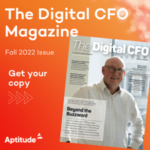Pairing his deep technology expertise with a career spent at some of the world’s largest and most renowned Financial Services organizations, Mark Winson-Pearce has worked across a variety of functions giving him insights into what makes a business work. The former Global Finance Chief Operating Officer at HSBC recently sat down at Aptitude HQ in London with Christophe Kasolowsky and Nick Shah to discuss his definition of a Digital CFO, the danger of departmental objectives, and the four questions to ask before starting a finance transformation.
Nick: To start us off, could you give us a brief summary of your career and background?
Mark: I spent the first half of my career in technology roles and the second half in finance and risk transformation roles. I started out as a computer programmer in the 1980s on the internet before it was called the internet! Back then I was Unix kernel programming, building device drivers, all sorts of hardcore stuff and then I accidentally found myself in financial services and writing trading room systems for UBS & Credit Suisse.
As time went on, I moved into transformation and COO roles at Credit Suisse, Santander and HSBC. Over the next 14 years as Global Finance COO at HSBC, I oversaw technology, projects, transformation, controls, finance operations across the globe, people strategy and communications. During my time I delivered many large, complex projects including building a bespoke banking GL, deploying Oracle Fusion globally, IFRS 9, moving finance processing to the cloud, growing our finance centers in India and Poland and significantly reducing the cost of the finance function.
Christophe: Let’s jump right in with our keynote question. We’ve seen the rise of the term ‘Digital CFO.’ What does being a Digital CFO mean to you? What does it look like in practice?
Mark: Admittedly, I think the term itself is a bit of a buzzword but that’s probably because I feel like I’ve been deeply involved with technology since I was 18 years old – my whole life has been digital. But I understand not every CFO or finance leader would have come up through so many tech-focused roles.
I think if I were to try and define a Digital CFO, it would be a person that understands the power of technology and knows how to leverage technology to grow their business. They are a business change agent.
I don’t believe that a CFO can lead a modern, forward-looking business unless they understand how to leverage technology. If the CFO sits in their office with a pen and paper and doesn’t really get on board with the technology agenda, I don’t see how they can be successful. If you’ve got a CFO that doesn’t understand how to digitalize their own department, how on earth are they going to understand how to lead a digital business?
Nick: So, let me ask you this: do you think, over the last 5 or 10 years, technology has become easier for CFOs to navigate? Has it become more straightforward to adopt?
Mark: I don’t think it’s easier. I think the implementation of solutions is easier. But I think today’s technology can still be quite bewildering for somebody who is not tech savvy. If you think about the median age of CFOs today, when they were starting out roughly 25 years ago in the mid 90’s they were just starting to access the Internet. Back then a computer was easy to understand; you had a desktop, you had a big monitor and an IT department to turn to for everything in the Data Center. Now most of your cloud solutions are managed offsite by vendors and you’ve got vast amounts of data, unimaginable processing power and a more complex architecture. So, I think that can lead to terminology and concepts that are harder for CFOs to get their head around.
Today’s Digital CFO should think less about closing the books and meeting regulatory requirements and more about growing the business for customers and shareholders and creating an exciting environment where employees can develop their talent.
Christophe: Recently a former colleague working at one of the top 10 largest Banks in the world said their organization has as much data as Amazon, yet they aren’t equipping the finance function to be able to inform and instruct the business in an effective way. What would you say to that observation?
Mark: I think that’s true of a lot of organizations. I think a big part of the problem lies with the fact that most organizations are not directive enough from the top down to be able to run a truly cross functional transformation. You may see separate transformation programmes across the functions and businesses all building their own bespoke data sets.
In these situations, each department is so focused on doing the best for their individual outcomes and what they don’t realize is, the value comes when they do the best for the organization, not just the function. You have to be able to get in a room together and agree on a data strategy. You have to think holistically about your data. When developing a cloud data agenda, focus less on identifying lots of new use cases and more on digitizing all the data that is currently available and being used – a sort of ‘build it and they will come’ mentality. This allows an organization to create an accurate, holistic big data set that could service multiple requirements.
In my mind, a Digital CFO should be focusing on creating the best digital representation of the data in their business. If you’ve got the right data, you can put whatever algorithm or system you want on top of it. It’s all about organizing the data in a way that allows you to do something with it.
Christophe: How would you advise a CFO at the beginning of a finance transformation journey given your career experiences?
Mark: First of all, I’d ask the following questions: Does it really need to be just a finance transformation? Are you absolutely clear what your objectives are? Do you have a business case where you understand exactly what you are going to spend and what you’re going to get out of it? And finally, do you have the rest of the business represented in the room?
I ask this last question because almost certainly your objectives are pan-functional. Almost certainly you’re not going to be delivering results in a silo. And even if your objective was just to do something for the finance department, you are 100% reliant on other functions to be able to achieve those goals. It’s certainly a challenge to get everyone to focus on the broader outcome than just a set of single transformations. Going back to getting everyone represented in that room, listen, everybody around the table needs to be on the same page and needs to be completely committed to the outcome. Because it should all be about the organization. And it’s about creating a team that’s got the same vision around execution. And you’ve got to be single minded in the execution, because if you’re not focused about measuring and making sure that you hit your milestones then you’re going to spend more money and get fewer benefits.
Nick: Transformation can take years and in most cases the people around the table change. Any advice around how you manage a change programme as new leaders come in with new visions and priorities?
Mark: That’s an interesting one. I’d come back to being crystal clear when the program starts as to the objectives and the reasons the project was started in the first place. This can help establish a lineage and make it clear to everyone why and how you’re making decisions. You know, you’ve been on lots of projects where you get two years in, and somebody will say ‘Why did we choose to do it that way? Can anyone remember?’
Christophe: Can finance teams use today’s technology options to address some of the legacy systems’ challenges further upstream to limit the amount of technology replacement they have to do?
Mark: The answer to that is obviously yes. It depends whether you’ve got the data in the format that you need it. As an example, a lot of the pain when moving to the cloud isn’t the data that you have, it is the data that you don’t have. It is sourcing the data, finding out how to get it. If you don’t get it through the ledger, could you get it via another route? You can use those workarounds. I’m not advocating reengineering the finance department from first principles, although that would be a good thing if you could do it.
Christophe: As a follow-on to that, does that put the ‘rip and replace the ERP’ transformation model at risk?
Mark: If the ERP vendors could do everything for an organization from front to back, which is what they promise they can do, the world would be a wonderful place. And I’m sure for many simpler organizations it does work. It’s pretty tough for the bigger, more complex ones; trying to make it work well for everything a finance function needs – Accounts Payable, Budgeting, Reporting, GL, Operations, Treasury, Analytics – does a single solution really exist?
Christophe: How do you think finance functions will be different in 10 or 20 years’ time?
Mark: I’d like to believe that there won’t be such a thing as a finance function as we currently know it in 10 or 20 years’ time, and that people will have moved on from having the silos in the back office and silos in the front office. They’ll run their business in a much more integrated way because they’ll have a data foundation for the organization, and they’ll run all of their functional apps around that data. I think organizations will be less concerned about where work is done and focus more on what’s the best outcome for the organization. The CFO will be somebody that’s focused on making business decisions rather than managing the intricacies of reporting.
Nick: Any final thoughts before we wrap up?
Mark: If there’s one thing I’ve learned in my career, it’s that for transformations, technology is not the thing that’s going to make you successful. The thing that’s going to make you successful is organizing a cross-functional team around the same objectives, to be on the same page and to be completely committed to the execution of your transformation. The technology will always work itself out. CFOs who are in charge of managing the bottom line for the firm should be strategically guiding the CEO on investment dollars. And as soon as the CFO sees separate siloed transformation investments they should be banging the table and not allowing that to happen.
Christophe: Thank you for sharing your insights and expertise, Mark!

Download the Fall 2022 Issue of The Digital CFO Magazine


